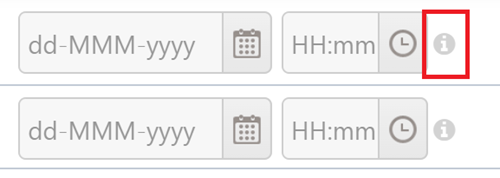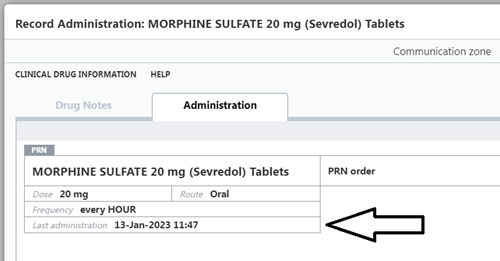HEPMA Update 4 - March 2023
This month’s blog highlights a number of issues around how to use the system safely and most effectively.
Please contact nhsggc.hepma@ggc.scot.nhs.uk if you have any ideas for future blogs.
Administering PRN medicines in HEPMA
The HEPMA system does not check or “count” doses administered in any 24 hour period, and therefore will allow charting (administration) of doses to be given at any time without warning of a recent administration and even if the “maximum” dose has been stated. You should always check the time of the last administration and cumulative doses given in the last 24 hours before administering a PRN medication. Please note – do not use the “Quick Chart” function to do this – more detailed information is held on the standard administration screen for PRN medication and allows better interpretation of last doses and cumulative doses.
The time of last administration is available on every HEPMA page (use zoom function to enlarge images and if using a mobile device, switch to landscape):
Quick Chart Page: hover over ‘i’ icon for Last Dose information


Administration Tab:

Administration Page:

Inpatient Tab: If time is obscured then hover over the Last administration date to also view time

The time of last administration in my PRN is not the same as when it was last given according to Administration History. What has happened?
A. If a STAT or Regular dose of exactly the same medicine/preparation is given – e.g. Paracetamol 500mg tablets STAT and Paracetamol 500mg tablets PRN, but not where it is part of a limited prescribing system, (MW Paracetamol (midwife prescribing) for example) the system will then record in the PRN last administration that the drug has been administered regularly or as a STAT. This is designed so that the user knows these have been given in between PRN doses.
Issues with WITNESSING administrations in HEPMA
If you are required to witness an administration of any medication in HEPMA, you will have to know your username and password. All users with permission to administer medicines, have permissions to also witness administrations (including Student Nurses). If you have any issues with witnessing medication and receive an error stating ‘The user credentials are not correct. Please check and resubmit’ please remember:
Username must be entered in capitals (or as per original set-up if not all capitals) and the password is also case sensitive.
If you are still having problems, then please try to reset your password using My Account; User Password at the top right of the HEPMA screen. If you are unable to do this, it would suggest you are using an incorrect password and it will need to be reset. IT can do this via the ehelp icon or #650, providing you have set up security questions using the link on the following page
http://www.staffnet.ggc.scot.nhs.uk/Pages/Online%20Directory.aspx
Prescribing of Vitamin D loading doses
New prescribing protocols for GGC Medicines - Vitamin D Prevention and Treatment of Deficiency in Adults have been added to HEPMA with 6 weeks of loading dose colecalciferol and then moving to the maintenance dose. There are protocols set up for administration on each day of the week for ease of prescribing for individual patients.
They can be found by searching the Protocol tab for ‘Colecalciferol’.
Drug Selection best practice
When prescribing a drug it is best practice to use at least 5 characters. This will reduce the list of drugs available to you and reduce the risk of making a selection error.
Examples where less than 5 letters could cause selection errors
Bisoprolol / Bisacodyl
Metoclopramide / Metoprolol
Flucloxacillin / Fluconazole
There are many other examples. This is especially a risk where the dosage units also match or are similar as in the bisoprolol / bisacodyl (5mg/5mg) and flucloxacillin / fluconazole (500mg/50mg) example.
Use at least 5 letters to reduce the risk of making an error.
Further information on HEPMA, including links to guides and training videos, can be found on StaffNet (GGC Network access required).
Previous Medicines Update blogs on HEPMA can be found by searching ‘HEPMA’ on GGC Medicines: Home.
Published: 28/03/2023. Medicines Update blogs are correct at the time of publishing.
If you would like to subscribe to Medicines Update or provide feedback on the blogs, email medicines.update@ggc.scot.nhs.uk.
Follow Medicines Update on Twitter @NHSGGCMeds
